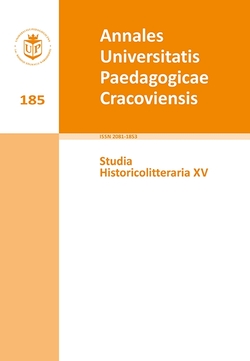Bellum civile, bellum externum. Ambiwalencja obrazów wojny w twórczości Horacego
Main Article Content
Abstract
Bellum civile, bellum externum. Ambivalence of war images in Horace’s works
The article aims at illustrating and explaining the ambivalence of images of just, external war (bellum externum) and civil, fratricidal war (bellum civile) in relation to the ancient literary theory and criticism, the phenomenon of political and cultural ‟patronage” and the political events of Augustan period. By analyzing the odes II 7 and III 2, epode 9 and ode I 37 the author argues that Horace’s initial litterary concept of presentation of civil and external war conventions as fas/nefas changes under the patronage. However, the poet himself, trying to preserve the poetic autonomy and meet the requirements of the ancient literary theory and criticism includes a new political and social situation in the sphere of his work.
Key words: Horace; criticism; war; patronage; autonomy;
Downloads
Article Details

This work is licensed under a Creative Commons Attribution-NonCommercial-NoDerivatives 4.0 International License.
COPYRIGHT POLICY
The publisher of "Annales Universitatis Paedagogicae Cracoviensis.Studia Historicolitteraria" is authorised to use and distribute all the materials published in the journal on the basis of a non-exclusive licence agreement unlimited in time – previously concluded for an indefinite period of time each time with the author of a specific paper in the fields of exploitation specified in the agreement.
OPEN ACCESS POLICY
"Annales Universitatis Paedagogicae Cracoviensis.Studia Historicolitteraria” is an open access journal, and all its contents are available for free to users and/or their institutions on the basis of non-exclusive licenses under Creative Commons (CC BY CC-BY-4.0). Users can read, download, make copies, distribute, print, search, or to link to full text articles in this journal without the prior permission of the publisher or the author.This is consistent with the definition of open access BOAI (http://www.soros.org/openaccess).
References
Arystofanes, Komedie, przeł. Ławińska-Tryszkowska, Wrocław 1991.
A Companion to Greek Religion, red. D. Ogden, Oxford 2007.
A Companion to Roman Religion, red. J. Rüpke, Singapore 2007.
Badian E., Roman Imperialism in the Late Republic, Oxford 1968.
Bowditch P. L., Horace and the Gift Economy of Patronage, Berkeley 2001.
Carter J., The Battle of Actium, New York 1970.
Delahunty R., Yoo J., From Just War to False Peace, „Chicago Journal of International Law” 13.01.2012.
Eck W., The Age of Augustus, przeł. D. Lucas-Schneider, Singapore 2007.
Frieman R., Horace’s attitude toward Roman civil war and foreign war, Ottawa 1972.
Gardner J. F., Family and Familia in Roman Law and Life, Oxford 1998.
Harris W., War and imperialism in Republican Rome 327–70 B.C., Oxford 1979.
Hemingson T., Custos Viri Mercurialis. Faunus in the Odes of Horace, Madison 2008.
Highet G., Masks and Faces in Satire, „Hermes” 1974, nr 102.
Homerika, przeł./oprac. W. Appel, Warszawa 2007.
Johnson T., Horace’s Iambic Criticism Casting Blame (Iambike Poiesis), Leiden 2012.
Kopek W., Parcus deorum cultor… (Carm. I 34) Horacy wobec religijnej propagandy Augusta, [w:] Propaganda w starożytności, red. B. Kołoczek, Kraków 2014.
Kw. H. Flaccus, Dzieła wszystkie, oprac. O. Jurewicz, t. I, Wrocław 1986.
Landels J., Music in Ancient Greece and Rome, London 2000.
Luce J. V., Cleopatra as Fatale Monstrum, „The Classical Quarterly” 1963, vol. 13, nr 2.
Nussbaum A., Just War. A Legal Concept?, „Michigan Law Review” 1943,vol. 42, nr 3, s. 453-479.
Roman L., Poetic Autonomy in Ancient Rome, Oxford 2014.
Saller R. P., “Familia, Domus”, and the Roman Conception of the Family, „Phoenix” 1984, vol. 38, nr 4.
Shotter D., Augustus Caesar, London–New York 2005.
Smith P., Poetic Tensions in the Horatian Recusatio, „The American Journal of Philology” 1968, vol. 89, nr 1, s. 56–65.
Southern P., Oktawian August, przeł. D. Kozińska, Warszawa 2003.
Syme R., Rewolucja Rzymska, przeł. A. Baziór, Poznań 2009.
Tatarkiewicz W., Dzieje sześciu pojęć, Warszawa 2011.
The Cambridge History of Classical Literature, red. P. Easterling, B. Knox, vol. I, Cambridge 1985.
Wójcik A., Talent i sztuka, Wrocław 1986.
Zanker P., The power of images in the age of Augustus, Ann Arbor 1988.
